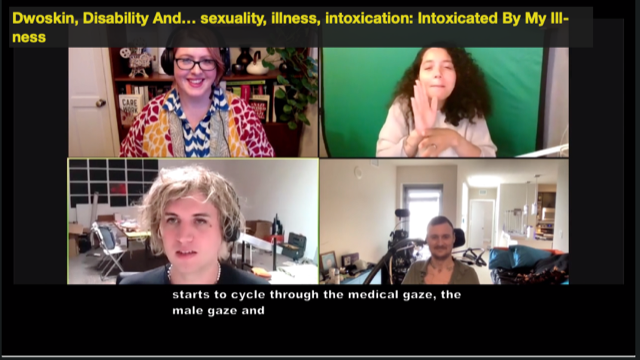A project designed to bring the work of experimental filmmaker Stephen Dwoskin to new audiences online is changing attitudes towards disability, accessibility, and art.
With cinemas and galleries across the UK forced to close during successive COVID-19 lockdowns, many have adapted to new models of digital engagement. A project led by Dr Jenny Chamarette in Reading’s School of Art has demonstrated the powerful opportunity this presents for establishing accessibility at the core of arts provision.
As part of the wider Dwoskin Project, Dr Chamarette, Professor Rachel Garfield and Dr Henry Miller used material and expertise from Reading’s Stephen Dwoskin Archive to curate a series of accessible online film screenings and discussion events using LUX’s online platform and publicity, featuring the work of disabled Jewish-American experimental artist and filmmaker, Stephen Dwoskin.
The events brought together disabled artists and policymakers to discuss disability, accessibility, and inclusion through screenings of three of Dwoskin’s films, each chosen to highlight Dwoskin’s complex relationships with disability, accessibility, and sexuality.
To facilitate engagement and participation by disabled audiences and creative practitioners, closed captions were produced for each of the films, while the panel discussions included live captioning and BSL interpretation by experts specialising in arts events. The series attracted a large, international and diverse audience from both academia and industry, with most respondents reporting that the events had changed their attitudes towards disability.
“This series has created a disability-aware approach (with a signer present) which surely should be the norm and not the exception.” Participant, Discussion event
Judges’ comment
“This is an excellent project in all respects. Highly creative and collaborative, it used a variety of engagement methods and made good use of opportunities afforded by lockdown to raise the profile of Reading’s Dwoskin archive.”
Team: Jenny Chamarette, Rachel Garfield, Henry Miller
In partnership with Birkbeck Institute for the Moving Image, The British Film Institute, LUX Artists’ Moving Image Agency
Funded by Arts and Humanities Research Council, University of Reading (Centre for Film Aesthetics and Cultures, Arts Committee and Diversity and Inclusion Initiatives Fund)
Shortlisted for the University Research Engagement and Impact Awards 2022
First published: June 2022

